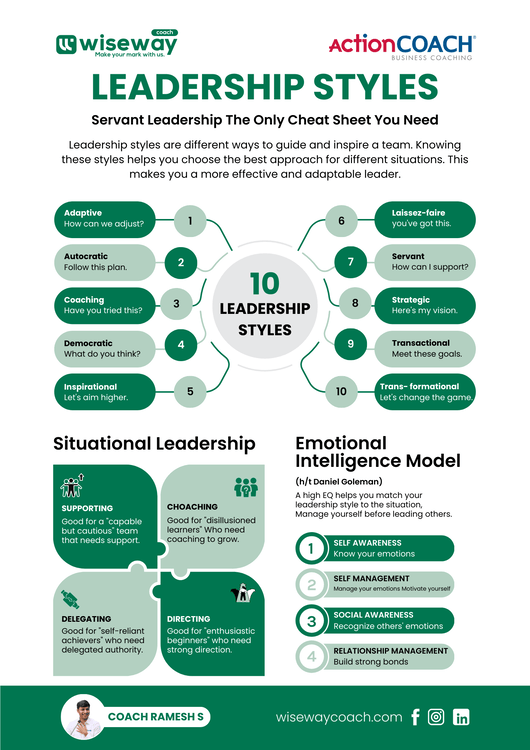Mastering Leadership Styles
July 18, 2024 2024-11-22 15:10Mastering Leadership Styles
Mastering Leadership Styles The Ultimate Cheat Sheet for Servant Leaders

Leadership is about adaptability and choosing the right style to inspire and guide your team. Understanding various leadership styles enables you to respond effectively to different team dynamics and challenges. Here’s an overview of 10 key leadership styles and complementary models for leadership success:
10 Leadership Styles
Adaptive
Focus on flexibility—adjust strategies to meet team needs.
Autocratic
Direct and decisive; best for situations requiring clear authority.
Coaching
Encourage team growth by mentoring and offering solutions.
Democratic
Value team input to foster collaboration.
Inspirational
Motivate teams to aim higher and achieve great results.
Laissez-Faire
Hands-off approach; trust skilled teams to self-manage.
Servant
Support your team by prioritizing their needs.
Strategic
Provide a vision that aligns with long-term goals.
Transactional
Focus on clear goals, performance metrics, and accountability.
Transformational
Inspire change and innovation by reshaping the game.
2.Decision-Making
Evaluate whether the change effort was successful.
If Yes, proceed to reflection and growth (#13).
If No, revisit and adjust from the beginning (#1).
Determine if there’s a new situation requiring leadership action.
3.Decision-Making
Review and Reflect
Analyze the situation to gather insights
Celebrate Achievements
Acknowledge milestones and successes.
Identify Strengths and Weaknesses
Pinpoint areas for development.
Create a Personal Action Plan
Set clear, actionable goals for continuous improvement.
Empathy is not about fixing someone’s feelings or offering pity; it’s about connecting on a human level by truly listening, understanding, and respecting their experience. In business and life, empathy builds trust, enhances collaboration, and opens doors to authentic relationships.
– Coach Ramesh S

(Listen + Perspective-Taking + Validation) x Non-Judgmental Support = True Empathy and Stronger Relationships
Listen First
Practice active listening by giving your full attention to others. Avoid interrupting or thinking of responses while they speak. This builds trust and shows respect.
Imagine Their Perspective
Visualize yourself in their situation to understand their feelings and motivations. This step helps you connect emotionally and develop a genuine understanding.
Acknowledge and Validate
Respond in a way that acknowledges their emotions without attempting to fix or change them. Simple phrases like “I understand” or “That sounds difficult” convey validation and support.
Offer Support, Not Solutions
Show concern by offering to help if needed but avoid imposing advice or solutions. Supportive presence is often more impactful than unsolicited guidance.

Actionable Tip
Start practicing empathy by actively listening during your next conversation. Focus on understanding rather than responding, and resist the urge to offer solutions. Instead, acknowledge the person’s emotions and let them know you’re there to support them. This simple shift fosters trust, helping build a deeper, more authentic connection.
Important Note
Empathy is an essential skill in both business and personal relationships. By practicing true empathy–listening without judgment, respecting others’ emotions, and offering genuine support–business professionals and leaders can build stronger connections, improve teamwork, and create a supportive, compassionate work environment.

For More Details
Ready to elevate your business? Our tailored coaching programs help entrepreneurs unlock their potential and achieve sustainable growth. Start with a free strategy session to discover your roadmap to success!